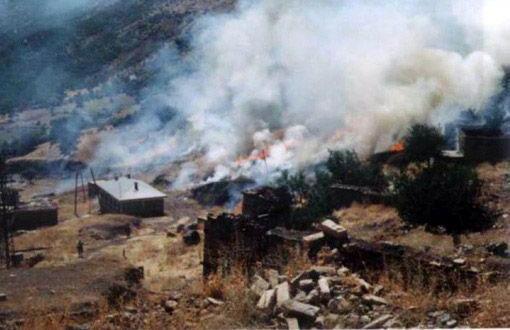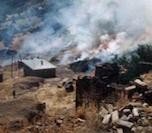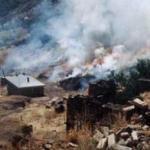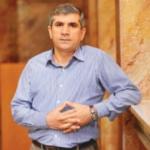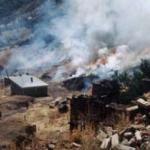Click to read the article in Turkish
26 years after the incident, the Second Section of the Constitutional Court has unanimously concluded that Kuşkonar and Koçağılı, two villages in this district of Uludere in Turkey's Kurdish-majority province of Şırnak, were bombarded by military planes in 1994 and that the right to life of 38 deceased people, the wounded and their relatives was violated.
As reported by T24 news website, the Constitutional Court has also ascertained that despite the judgement of right violation given by the European Court of Human Rights (ECtHR) in 2014, the necessary attention was not shown in the investigation and the file was closed due to statutory limitations, which has led to a failure to penalize the responsible parties.
The supreme court has also concluded that this failure impaired the judiciary's role to prevent similar violations of right to life.
Noting that villagers were treated in a way incompatible with human dignity, the court has also indicated that the violations in question can only be compensated with non-pecuniary damages due to statute of limitations.
Application for reinvestigation into Roboski
In a similar incident on December 28, 2011, warplanes of the Turkish Armed Forces (TAF) dropped four bombs on Roboski village in Uludere, Şırnak. 34 villagers, 19 of whom were children, lost their lives.
Examining the application regarding the Roboski massacre, the Constitutional Court rejected the file on procedural grounds because that the application was not submitted within the stipulated time period. As reported by T24, it is the first time that the Constitutional Court has ruled that civilian villagers were shot by war planes and it is a grave violation of the right to life.
Speaking to bianet about the Roboski investigation, lawyer Erkan Şenses has stated that they have made applications to the Uludere Public Prosecutor's Office and the Military Prosecutor's Office a year ago, requesting that an investigation be launched into the incidnet again. He has indicated that they are awaiting the result of these applications.
CLICK - Eighth Anniversary of Roboski Massacre
'Elçi created the investigation out of nothing'
Speaking to bianet, Neşet Giresun, one of the attorneys for Roboski families, has given the following information about Roboski:
"In the Roboski investigation, no examinations were made as to the merits. However, indicating that there is new evidence, we have made an application to the Uludere Chief Public Prosecutor's Office, requesting a reinvestigation. It has not yet been concluded.
"But if a new investigation is launched, an examination is conducted as to the merits and the court concludes that legal remedies have been exhausted, an application can be made to the upper court for an examination as to the merits or to the European Court of Human Rights (ECtHR).
"Kuşkonar and Koçağılı villages were bombed in 1994, the public almost did not even hear about it. Tahir Elçi created the investigation out of nothing. Roboski happened before the eyes of the public; however, due to simple procedural mistakes, the investigation ended in non-prosecution."
CLICK - ECtHR Rejects Application About Roboski Massacre
ECtHR said it was violation of right to life
Assassinated Diyarbakır Bar Chair Tahir Elçi applied to the ECtHR on behalf of 41 wounded villagers in 2006 and said that the investigation into the bombardment in 1994 was not effectively conducted.
The government said that it was not fair to givr a judgement 20 years after the incident happened and accused the complainants. The ECtHR found it normal and examined the application as to the merits.
Indicating that there was an unwillingness to penalize the responsible parties despite the existence of ample evidence on the bombing, the ECtHR concluded that the right to life was violated as to the merits as well.
The court also said that villagers were subjected to inhuman treatment as they buried their deceased relatives in neighboring villages, they received no help, they were forced to leave their villages and their homes were damaged for no reason, which reached the minimum limit in that regard.
The ECtHR ruled that the responsible parties should be penalized and the relatives of the deceased should be paid damages in varying amounts ranging from 20 thousand to 135 thousand Euro.
When the file was sent to the related military prosecutor's office, the file was closed with a decision of non-prosecution on the stated grounds that there was no evidence proving that the planes bombarded the villages and that the statute of limitations was violated.
In response to this decision of non-prosecution, Tahir Elçi took the issue to the Constitutional Court.
Damages of 40 thousand lira to 130 thousand lira
The Constitutional Court has concluded this application 26 years later. The supreme court has ascertained that the investigation was closed with statute of limitations without identifying the responsible parties.
The ruling of the Constitutional Court has indicated that "after this point, it has not been possible for the judicial authorities to identify the persons who may have responsibility in the incident on the grounds that evidence have disappeared in time since the incident happened, it has become difficult to remember what happened, it has gradually become more difficult to collect evidence for reasons such as the military authorities' destruction of archival records after a certain period of time."
Against this backdrop, the court has concluded that "the judicial authorities did not display the necessary speed and attention to avoid appearing like unlawful acts were tolerated or met with indifference; they did not act with reasonable attention and speed in such a way to cause the impairment of the judiciary's role to prevent similar violations of right to life that could occur later; the lapse of time led to a failure to penalize the responsible parties; and the requirements arising from the ECtHR ruling were not fulfilled."
Accordingly, considering that the consequences of the violation cannot be compensated due to the lapse of time, the Constitutional Court has ruled that the applicants shall be paid damages in varying amounts ranging from 40 thousand Turkish Lira (TRY) to 130 thousand TRY.
What happened?
On March 26, 1994, when military operations against the Kurdistan Workers' Party were especially intense in southeast Turkey, two villages Kuşkonar and Koçağılı in Uludure, Şırnak were bombarded by two planes and one helicopter, according to witness statements. The bombardment reportedly started at 11 a.m. When it ended, 38 people died in two villages with hundreds of inhabitants. 13 villagers were wounded.
Though villagers elaborately described the planes in their depositions, the General Staff denied the allegations, sayih, "We had no flights that day."
After the villagers buried their relatives in mass graves, they migrated to the west and did not return to their villages again. In the first statement about the incident, it was indicated that the attack was carried out by the PKK. The incident was brought into Parliamentary agenda in 1994.
Minister of Interior Nahit Menteşe said, "Tipped off about a group of 1,000 terrorists preparing to act, an air operation was launched on the cliffs in the north of Stoker Hill and Kuşkonar Village." The General Staff denied the bombardment of the village, saying, "We did not fly in the region on that day." The Air Force also sent a document indicating the same thing. The trace of planes cited in the witness statements remained a secret for years.
12 years after the incident, the Military Prosecutor's Office of the 2nd Air Force Command launched an investigation with the number 2006/260. The Diyarbakır Chief Public Prosecutor's Office asked the Air Force Command about the allegations in 2008. Kazım Öndül, the Main Jet Base Commander Air Pilot Brigadier in Diyarbakır, told the prosecutor's office, "No record could be found as to any flight activities conducted in our base at the indicated date." The 2nd Air Force Command also gave the same answer.
A decision of lack of jurisdiction was handed down at the end of the investigation two years later. The incident was referred to as "explosions, the origin of which could not be identified."
Witness statements
Ahmet Mengi:
At first, while a helicopter was flying over our village Koçağılı, it dropped something giving a sign. Then, two jets dropped four bombs each, eight bombs in total, they were all bigger than a human. Our village was raked by jets. Our house collapsed due to bombs. My mother and daughter died. My wife Behiye was wounded in her head. Even though we went to doctors till today, she cannot recover. My step mother could not recover, she died two months later. The village guards and citizens who came to our village after the incident took away the dead and the wounded. I do not know where they buried my own mother and daughter.
Ahmet Yıldırım:
I am from Kuşkonar. I was in front of my house around noon. Two planes flied over at a very close altitude. As it was really noisy, I rushed to the basement. I heard a big explosion. I went out when it got quiet. I saw my wife lying in front of the house, her body torn apart. Then, I learnt that my several relatives died. We collected the dead bodies at the village square. Graves were opened for them one by one. I saw a 2.5-meter hole 30 meters ahead of my house. I saw a bomb fragment the size of an arm around the hole. 2-3 days after this, we took the animals and our staff that we could and left the village. Other villagers went to Mersin and Siirt. I did not return to the village again...
People who lost their lives
The names of citizens who died in the bombardment of four planes:
Zahide Kıraç, Ayşe Bengi, Şirin Kaçar, Huhi Kaçar, Şemsihan Kaçar, Fatım Bengi, Ahmet Kaçar, Şehriban Kaçar, Huri Bengi, Liluz Bengi, Fatma Bedir, Hazal Kıraç, Asiye Erdin, Ömer Kalkan, Mahmut Benzer, Ali Benzer, Nurettin Benzer, Ömer Benzer, Abdullah Benzer, Çiçek Benzer, Ayşe Benzer, İbrahim Borak, Şerife Yıldırım, Melike Yıldırım, Şaban Yıldırım, İrfan Yıldırım, Elmas Yıldırım, Ferciye Altan, Hacı Altan, Kerem Altan, Mahmut Oygur, Ayşe Oygur, Adil Oygur, Asiye Yıldırım, Kerem Yıldırım, Mirza Yıldırım, Şevket Yıldırım, Hunav Yıldırım. (AS/SD)




